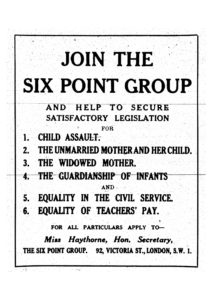
In February 1921, The Six Point Group was launched. Led by pioneering feminists, including Time and Tide’s founder, Lady Margaret Rhondda, its editor Helen Archdale and an army of other key Time and Tide’s figures, they campaigned for a Six Point ‘Women’s Program’. At a time when women’s political, social, and occupational opportunities were beginning to blossom, the SPG fought to improve women’s welfare and employment rights and urged ‘satisfactory legislation’ for:
- The unmarried mother and her child
- The widowed mother
- Guardianship of infants.
- Equality of the child service
- Equality in teacher’s pay.
One hundred years later, you might think these goals have been met. However, inequalities remain, and COVID-19 threatens to roll the clock back even further on welfare and employability for many women. Held to celebrate the Six Point Group’s centenary, the recent Agendas for Change panel discussion engaged with this threat.
The first speaker was Felicia Willow, Interim CEO of the Fawcett Society, who highlighted issues raised by the Society’s Making Women Visible campaign, which shows that women are amongst those hardest hit by the pandemic. More women work in sectors such as hospitality and care than men and many find themselves facing redundancy and uncertainty. Many are having to decide between their careers and caring responsibilities: a clear example of how the government response to COVID has been male dominated. Money has been pumped into areas like construction rather than social care, which had been on a knife edge event ‘before anyone had even heard of COVID.’ Looking beyond the pandemic, Felicia asked, ‘how will women get back to work when childcare is on its knees?’
These questions feed into other important issues that were raised in the panel, one of which is the ever-present gender pay gap. As highlighted by the second speaker, Denise Fowler, the gender pay gap has serious repercussions when it comes to affording somewhere to live. As CEO of Women’s Pioneer Housing, Denise spoke to the importance of having a safe and secure home, something which has resonated with many during the pandemic.
Women’s Pioneer Housing, which, like Time and Tide, celebrated its centenary in 2020, was founded to address the need for safe, affordable housing for independent women when new opportunities enabled them to pursue careers outside the home. One hundred years later, the organisation is still working with women who cannot afford to live in cities such as London. The pay gap is a huge contributor to this. Denise delivered some shocking statistics. In 2018, women earned on average 33% less than men. More shockingly, there is no region in the UK where a single woman can comfortably afford to rent a property of her own, let alone buy one – yet single men, on the other hand, can afford to buy everywhere but in London. This is immensely problematic as more women strive to pursue successful careers yet find themselves in shared housing or living with their parents. More worryingly, high rents are forcing some women to remain in situations where they are experiencing domestic abuse, which has reportedly worsened over the pandemic. Denise truly shone an essential light on these problems, which emerge from inequality and austerity.
The final speaker, Nadia Whittome, Labour MP for Nottingham East, underlined the importance of grass-roots movements and highlighted how all of us can engage in the campaign for change as a united community.
Inside Parliament, Nadia spoke of how she and many other feminist MPs have overcome the hostility of the Commons to bring women’s issues to the top of the agenda. Despite funding cuts, which have disproportionately affected women, the combined effort of MPs who want to protect women’s rights and the on-going actions of grass-roots groups can really push the progress made over the last one hundred years in the right direction.
‘The progress we have made has been off the backs of amazing women’ Nadia stressed and, imperatively, maintained that going forward we need to fight to protect the rights of all women – including transgender and migrant women. Over the pandemic, the government has been forced to make U-turns on policies. The same can be done to inspire change for women’s rights. By engaging with social movements and writing to MPs, the campaign can grow stronger.
The event epitomised how conversation, movements and action can invoke change. It also highlighted what more we need to do to promote and fight for gender equality. Although COVID-still threatens to unravel the progress pioneering women have made in the last one hundred years, the inspirational panellists offer hope that soon, perhaps, gender inequality will be a thing of the past.
By Grace Pells. Grace is an MA Journalism student at Nottingham Trent University. You can watch a recording of this panel on our Agendas for Change page.